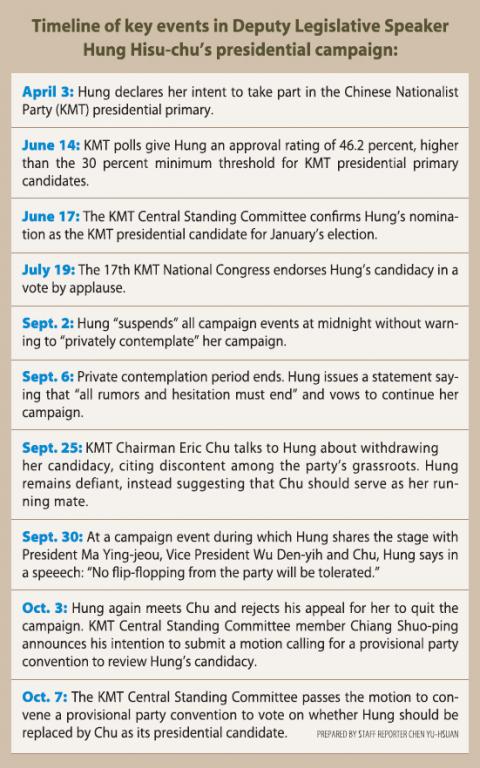There was a time when the Chinese Nationalist Party (KMT) and President Ma Ying-jeou’s (馬英九) administration could console themselves with at least one perceived advantage over the Democratic Progressive Party: their cross-strait policy.
That KMT presidential candidate Hung Hsiu-chu (洪秀柱) managed to squander even that advantage away explains why the KMT now appears it would stop at nothing to annul her candidacy.
The fundamental weakness of Hung’s campaign is her radical pro-unification ideology, which has prompted the top echelons of the Presidential Office, the KMT and “elders” with the pan-blue camp to unite in calls for her to withdraw from the presidential race.

If she were allowed to continue, Hung’s cross-strait platform — a mess for which Hung has only herself to blame — would doom not only her campaign, but also those of KMT legislative candidates.
A KMT rout from the legislature would be the kind of nightmare scenario in which the party’s continued existence would not be guaranteed. Yet Hung apparently remains oblivious to the disaster she has created.
Therefore, KMT leaders have in recent days demonstrated considerable resolve in neutralizing Hung, running roughshod over procedural niceties, as well as public opinion.
The KMT Central Standing Committee on Wednedsay unanimously passed a resolution to call an extraordinary party congress to deliberate a proposal to replace her.
Although the KMT headquarters’ drastic methods prompted criticism, Hung’s stubborn and unthinking refusal to confront the matter has left the KMT no choice — “whatever the costs, Hung must go.”
KMT Chairman Eric Chu (朱立倫) voiced the discontent of grassroots members when he panned her cross-strait policy as out of touch with mainstream public opinion.
However, Hung brushed Chu off and blithely attributed the public furor over her China policy comments to “flawed communication.”
Ultimately, Hung’s self-righteous belief in her role as a champion of “truth,” and her indifference to the survival of KMT legislative candidates, are the reasons the KMT has “collectively disidentified” with Hung.
Hung’s cross-strait stance relies heavily on the ideas of Chang Ya-chung (張亞中), an academic with strong pro-unification views; crucially, Hung’s China policy discourse goes above and beyond Ma’s.
After Hung heedlessly crossed the Ma government’s “China-policy red line,” Ma had no choice but to sever his support for Hung.
A pan-blue camp politician once said that if, for the sake of argument, one concedes that the KMT is “pro-China,” then in comparison with the KMT, Chang and his ilk are “just red.” Left unchecked, the “red tide” from Hung’s campaign would crush the KMT as surely as it has crushed Hung.
Translated by staff writer Jonathan Chin

Chinese Nationalist Party (KMT) Chairman Eric Chu (朱立倫), spokeswoman Yang Chih-yu (楊智伃) and Legislator Hsieh Lung-chieh (謝龍介) would be summoned by police for questioning for leading an illegal assembly on Thursday evening last week, Minister of the Interior Liu Shyh-fang (劉世芳) said today. The three KMT officials led an assembly outside the Taipei City Prosecutors’ Office, a restricted area where public assembly is not allowed, protesting the questioning of several KMT staff and searches of KMT headquarters and offices in a recall petition forgery case. Chu, Yang and Hsieh are all suspected of contravening the Assembly and Parade Act (集會遊行法) by holding

PRAISE: Japanese visitor Takashi Kubota said the Taiwanese temple architecture images showcased in the AI Art Gallery were the most impressive displays he saw Taiwan does not have an official pavilion at the World Expo in Osaka, Japan, because of its diplomatic predicament, but the government-backed Tech World pavilion is drawing interest with its unique recreations of works by Taiwanese artists. The pavilion features an artificial intelligence (AI)-based art gallery showcasing works of famous Taiwanese artists from the Japanese colonial period using innovative technologies. Among its main simulated displays are Eastern gouache paintings by Chen Chin (陳進), Lin Yu-shan (林玉山) and Kuo Hsueh-hu (郭雪湖), who were the three young Taiwanese painters selected for the East Asian Painting exhibition in 1927. Gouache is a water-based

Taiwan would welcome the return of Honduras as a diplomatic ally if its next president decides to make such a move, Minister of Foreign Affairs Lin Chia-lung (林佳龍) said yesterday. “Of course, we would welcome Honduras if they want to restore diplomatic ties with Taiwan after their elections,” Lin said at a meeting of the legislature’s Foreign Affairs and National Defense Committee, when asked to comment on statements made by two of the three Honduran presidential candidates during the presidential campaign in the Central American country. Taiwan is paying close attention to the region as a whole in the wake of a

OFF-TARGET: More than 30,000 participants were expected to take part in the Games next month, but only 6,550 foreign and 19,400 Taiwanese athletes have registered Taipei city councilors yesterday blasted the organizers of next month’s World Masters Games over sudden timetable and venue changes, which they said have caused thousands of participants to back out of the international sporting event, among other organizational issues. They also cited visa delays and political interference by China as reasons many foreign athletes are requesting refunds for the event, to be held from May 17 to 30. Jointly organized by the Taipei and New Taipei City governments, the games have been rocked by numerous controversies since preparations began in 2020. Taipei City Councilor Lin Yen-feng (林延鳳) said yesterday that new measures by